Exclusive: Shift in sentiment requires EU politicians to focus on defining an acceptable peace, say authors
Support for Ukraine among Europeans remains broad, but nearly two years after the full-scale invasion barely 10% now believe it can defeat Russia, according to an EU-wide survey – with some form of “compromise settlement” seen as the most likely end point.
The shift in sentiment – this time last year, more Europeans than not said Ukraine must regain all its lost territory – will demand that politicians take a more “realistic” approach that focuses on defining what an acceptable peace must actually mean, the report’s authors argue.
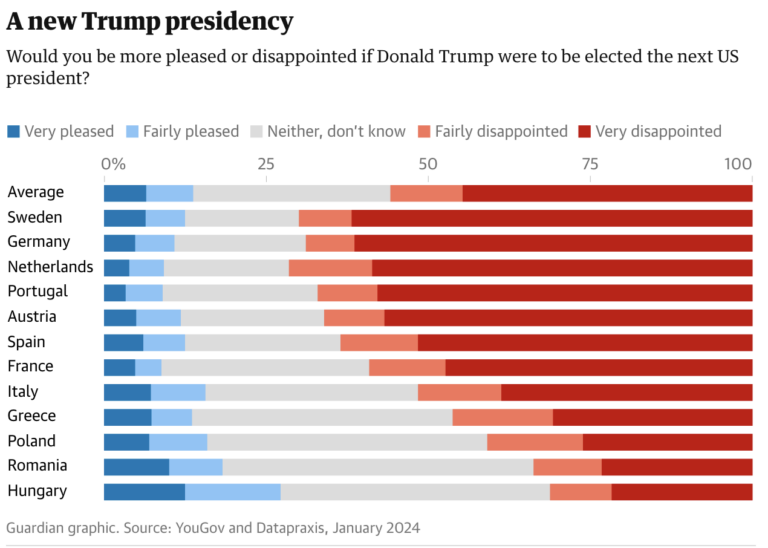
Most Europeans “are desperate to prevent a Russian victory” but do not believe Kyiv can win militarily, Leonard said, meaning that the most convincing argument for an increasingly sceptical public was that continuing aid “could lead to a sustainable, negotiated peace that favours Kyiv – rather than a victory for Putin”.
The January polling in 12 EU member states – including France, Germany, Hungary, Italy, the Netherlands, Poland, Spain and Sweden – found that Ukraine’s stalled counteroffensive, growing fears of a US policy shift and the prospect of a second US presidential term for Donald Trump were fuelling pessimism about the war’s outcome.
It was carried out before Ukraine’s retreat at the weekend from the eastern town of Avdiivka, which handed Russia its most significant military victory since the capture of Bakhmut by Wagner troops in May 2023. Russia launched its full-scale invasion of Ukraine on 24 February 2022.
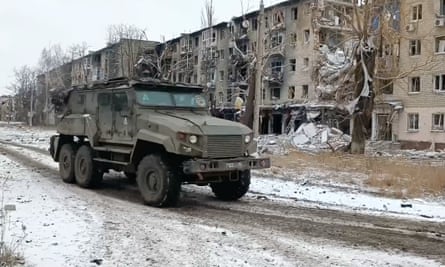
The report, Wars and Elections: How European leaders can maintain public support for Ukraine, found that only one in 10 Europeans across the 12 countries surveyed believed Ukraine would win on the battlefield, while twice as many (20%) predicted a Russian victory. Even in the most optimistic member states surveyed – Poland, Sweden and Portugal – fewer than one in five (17%) believed Kyiv could prevail.
In all countries, the polling showed, the most common opinion, shared by an average of 37% of respondents, was that the war would end in a compromise settlement – although some countries were keener on that outcome than others.
In Sweden (50%), Portugal (48%) and Poland (47%), respondents were more likely to say Europe should help Ukraine fight back, while in Hungary (64%), Greece (59%), Italy (52%) and Austria (49%), they preferred pushing Kyiv to accept a settlement. In France, Germany, the Netherlands and Spain, opinions were more evenly divided.
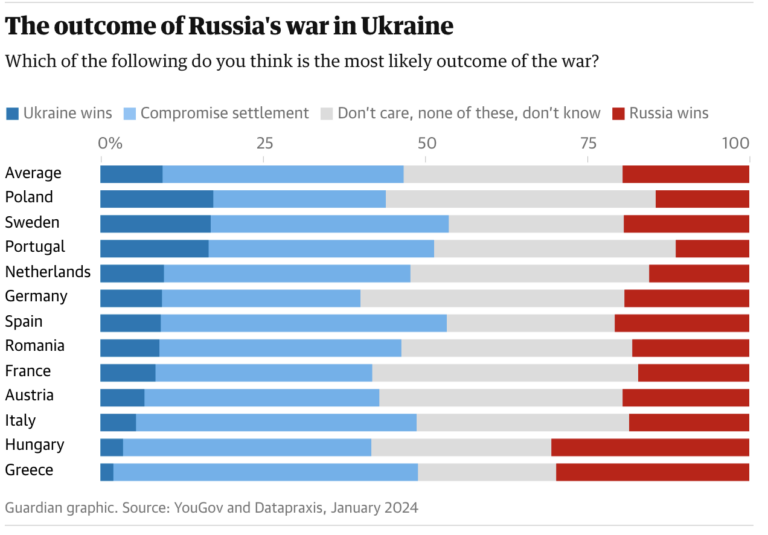
The polling yielded evidence that many Europeans increasingly considered Russia’s war against Ukraine to be of direct concern to them, with 33% saying it had a greater impact on their country – and on Europe (29%) – than the war in the Middle East (compared to 5% who said the opposite on both counts).
The possible return of Trump to the White House was broadly seen as bad news, with 56% of respondents across the 12 countries surveyed saying they would be very or fairly disappointed if the former president was re-elected.
The only exception was Hungary, where 27% of respondents said they would be pleased by Trump’s return and 31% disappointed. Similarly, supporters of only one major political party – Hungary’s Fidesz – were hopeful of a Trump victory.
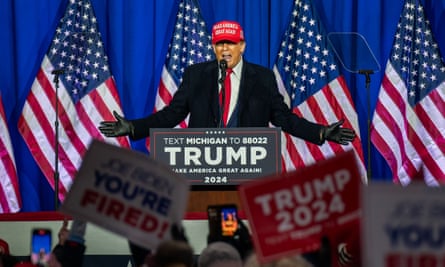
Among other far-right parties previously expressing support for Trump, only about a third of voters for Germany’s AfD, Austria’s FPÖ or Brothers of Italy said they would welcome his return, with pro-Trump sentiment even weaker among supporters of France’s National Rally and Poland’s Law and Justice.
If the US were to halt military aid to Ukraine under a Trump presidency, 41% of Europeans said that the EU should either increase its support or maintain it at its current level, while 33% would prefer the EU to follow the US lead.
On the second anniversary of Russia’a invasion of Ukraine, the report’s authors said Europeans were not in a “heroic mood”, or even optimistic about the situation. But, they said, Europeans’ commitment to preventing a Russian victory had not moved.
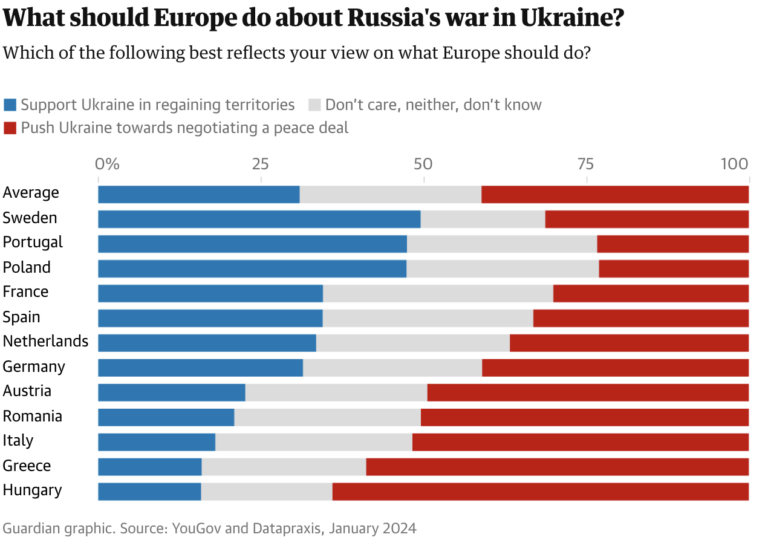
The challenge for western policymakers, they argued, would be to successfully address the dichotomy between falling public confidence about how the war would end, and the desire to maintain support in order to prevent a Russian victory.
“As Europe and the US enter election season, the quest to define peace will be a critical battleground,” the authors wrote. “Leaders will need to find a new language that resonates with current sentiment.”
Ivan Krastev, the report’s other co-author, said the biggest danger was that Trump – and the Russian president, Vladimir Putin, who has hinted that he is open to negotiations on his terms – “try to portray Ukraine and its backers as the ‘forever war’ party, while they claim the mantle of ‘peace,’”
A Russian victory “is not peace”, said Krastev, who is chair of the Sofia-based Centre for Liberal Strategies thinktank. “If the price of ending the war is turning Ukraine into a no man’s land, this will be a defeat not only for Kyiv but for Europe and its security.”
excerpts: The Guardian


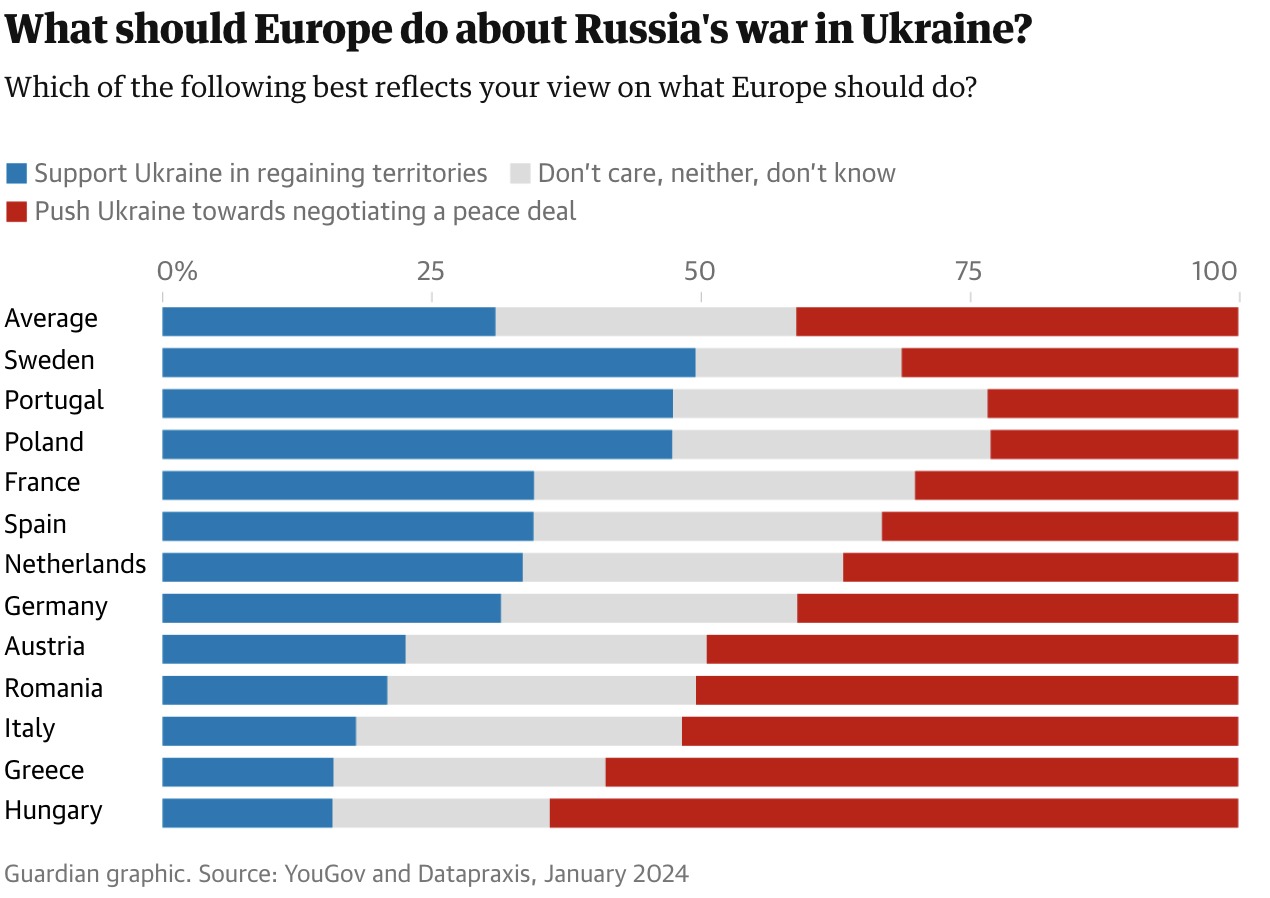

COMMENTS